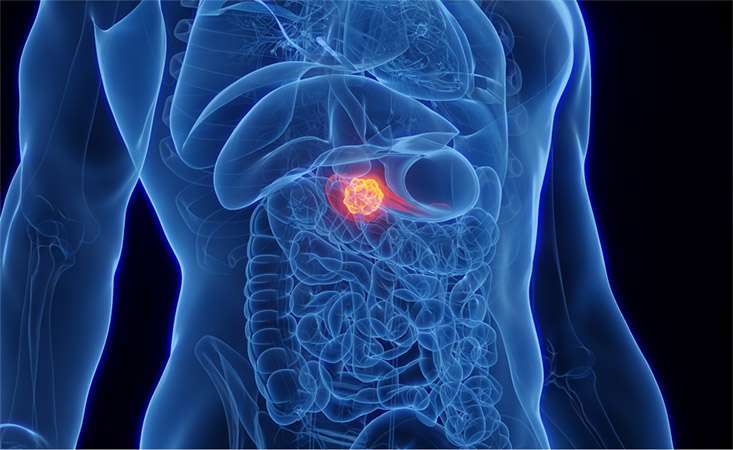
Editor’s Note: “Five Key Facts About PNETs” was originally published in February 2020. Here, we update that blog post with new information in light of an announcement from television personality Maria Menounos that she was diagnosed with a PNET, a rare type of pancreatic cancer. PNETs are less common than pancreatic ductal adenocarcinoma (PDAC). They are very different biologically and clinically and require specialized care. Contact PanCAN Patient Services for a free booklet about PNETs and personalized support.
On May 3, television personality Maria Menounos revealed that she was diagnosed with a PNET, sometimes called a PanNET or pancreatic neuroendocrine tumor, in January of 2023. The 44-year-old talked candidly about the vague symptoms she experienced and her long road to diagnosis. Because her tumor was detected at an early stage, stage II, she was able to have surgery to remove the cancerous tumor.
Her story underscores the importance of being aware of the signs and symptoms of pancreatic cancer. Because symptoms can be mild in early stages of the disease, they can often be overlooked or easy to ignore. In interviews, Menounos credited early detection with putting her on the path to surgery with a good prognosis. She urged others to be proactive about their health and to advocate for themselves.
Here, we share more about PNETs, a rare type of pancreatic cancer that differs from the more common diagnosis of pancreatic ductal adenocarcinoma (PDAC). The overall five-year survival rate for all pancreatic cancer is 12% and the five-year survival rate for PNETs is 53%.
It is important to understand the difference between PNETs and PDAC. Here are five important facts to know:
1) PNETs originate from the endocrine (hormone-producing) cells of the pancreas.
The pancreas has two main functions: exocrine functions involve the production of enzymes to break down food, and endocrine functions involve the production and regulation of hormones that maintain proper sugar levels in the blood.
2) Less than 10% of pancreatic cancer diagnoses are PNETs.
The two main types of pancreatic cancer are PDAC and neuroendocrine (also referred to as islet cell tumors). Less than 10% of the 64,050 pancreatic cancer diagnoses expected in 2023 will be PNETs. PNETs are generally slower growing and less aggressive than PDAC.
There is not one standard imaging test for diagnosing PNETs. Doctors may use one or more types of imaging tests -- like CT scans, MRI or endoscopic ultrasound – and for PNETs, there are special tests known as nuclear imaging tests. These tests use an injection of a synthetic version of somatostatin analogues (SSA’s), a type of molecule used by cells in the pancreas. This chemical sticks to the cell and can show up in imaging tests, helping doctors identify possible cancer. To learn more about these tests, contact PanCAN Patient Services.
3) PNET symptoms vary depending on the type of tumor.
PNETs can be classified as functional (hormone-producing) or nonfunctional (don’t produce hormones).
Functional PNETs, which are less common, can cause symptoms that depend on the type of hormone that the tumor cells produce. For example, gastrinomas overproduce gastrin, which leads to acid reflux, burning abdominal pain and other gastrointestinal symptoms.
More commonly, PNETs are nonfunctional, and these tumors lead to vague symptoms like pain or jaundice if the tumor is large.
4) PNETs are treated differently than adenocarcinoma.
There are some treatment strategies that could apply to both PNETs and adenocarcinoma, such as surgery, radiation therapy or chemotherapy, although different chemotherapy agents are typically used.
Targeted therapies, such as Sutent® and Afinitor®, have been approved for the treatment of PNETs. Lutathera is a type of hormonal therapy that can be effective for PNET patients whose tumors express somatostatin receptors.
All patients with pancreatic cancer, including those with PNETs, are also encouraged to consider clinical trials.
PanCAN maintains a comprehensive database containing up-to-date information about all pancreatic cancer clinical trials taking place in the United States – including trials for PNET patients. Every treatment available today was approved through a clinical trial. PanCAN strongly recommends clinical trials at diagnosis and during every treatment decision.
5) PanCAN Patient Services is here to help.
PanCAN Patient Services can provide PNET patients and their caregivers with accurate, up-to-date information about the diagnosis and treatment of neuroendocrine tumors of the pancreas.
Resources available to PNET patients include personalized clinical trials searches and access to PanCAN’s Know Your Tumor® precision medicine service to determine if a particular treatment aligns with the patient’s or their tumor’s biological characteristics. In addition, PanCAN can provide a list of PNET specialists and a free booklet with in-depth information specific to PNET diagnosis and treatment.
Other well-known figures have also been diagnosed with PNETs in the past, including singer-songwriter Aretha Franklin, who passed away in 2018, and Apple CEO Steve Jobs, who passed away in 2011.
















